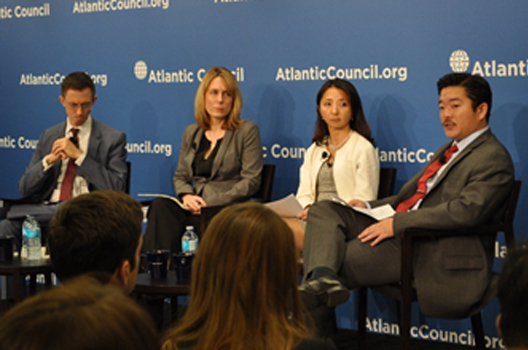 On December 2, the Atlantic Council’s Brent Scowcroft Center on International Security hosted a discussion on the incoming administration’s Asia policy and its potential impacts for the region. The session was led by David Wertime, a senior editor at Foreign Policy magazine.
On December 2, the Atlantic Council’s Brent Scowcroft Center on International Security hosted a discussion on the incoming administration’s Asia policy and its potential impacts for the region. The session was led by David Wertime, a senior editor at Foreign Policy magazine.
Following a welcome and introductory remarks by the Honorable Jon M. Huntsman, Jr., Chairman of the Atlantic Council, Wertime moderated a panel on President-Elect Trump’s Asia policy featuring Russell Hsiao, executive director of the Global Taiwan Institute; Shihoko Goto, senior associate for Northeast Asia at the Woodrow Wilson Center’s Asia Program; and Meredith Miller, vice president at Albright Stonebridge Group.
Hsiao indicated the uncertainty regarding Donald Trump’s position on Taiwan is the biggest challenge in foreseeing his policy towards Taiwan and cross-strait relations. Trump showed a willingness to accept war and a willingness to loosen restrictions on allies’ and partners’ capabilities when he condoned Japan and South Korea to go nuclear. The new administration’s Asia policy is unlikely to loosen US security commitment to the region. Instead, it will have an emphasis on military strength and statecraft. The pivot or strategic balance is not going away, but will be better executed, according to Alexander Gray and Peter Navarro’s op-ed in Foreign Policy outlining Trump’s “Peace Through Strength” vision. The conduct of foreign policy under a Trump administration will be more transactional as he promised to focus more on bilateral relations than multilateral institutions. Finally, how President-elect Trump defines American interests will determine his priorities in the Asia-Pacific region.
Goto pointed out that challenges facing Northeast Asia have not changed but possible approaches have. The sources of instability include accommodating China’s rise, dealing with North Korea’s nuclear ambitions, and the uncertainty about the future of Pax Americana. Although US commitment to uphold the existing international order has been providing growth and prosperity to the region, the uncertainty can be an opportunity according to the initial market reaction to the election result. Future trade agreements could be the first limits test for Japan and South Korea. For Japan, how it pursues multi-lateral trade agreements will define its standing in the Asia-Pacific and its relations with the United States. Japanese Prime Minister Shinzo Abe remains committed to pushing forward with the Trans-Pacific Partnership (TPP) and said Japan does not want to pursue bilateral agreements with the twelve member countries of the TPP. This position directly conflicts with what Trump envisions. The alternative solution for Abe is to complete the TPP without the United States. If so, Japan will become the single biggest economy globally and it will be an opportunity for Abe to promote Japan as a leader in Asia to ensure stability and a new economic order. As for South Korea, it was never part of the TPP, but has one of the largest number of free trade agreements (FTAs) in the world. It’s two major concerns regarding trade are the future of US-Korea Free Trade Agreement (KORUS FTA), and the possibility of Trump declaring South Korea as a currency manipulator. Trump could renegotiate KORUS FTA despite the fact that US exports to South Korea has increased since KORUS establishment. Trump’s reoccurring statement of China being a currency manipulator poses some concerns since South Korea is on the US Department of Treasury’s monitoring list along with China, Japan, Taiwan, Germany, and Switzerland. Goto concluded that non-action within the first one hundred days would indicate that the United States is prepared to analyze and listen, which should be defined as a success for a Trump administration.
Miller explained that the Southeast Asian countries are distinctively different from one another. The reactions to the US presidential result and expectations of the upcoming administration vary within the region. The Obama administration has directed its resources in supporting preeminent regional institutions and elevating relations with Vietnam and Myanmar in particular. Whether Trump will continue these efforts and recognize the important role of the Association of Southeast Asian Nations (ASEAN) in counterbalancing China’s growing economic strategic clout and territorial claims in the South China Sea will remain to be seen. In regards to trade relationships and policy, many Southeast Asian countries are concerned with the prospects of heightened trade war between China and Japan, because their supply chains are very much integrated to the two markets. As the initial members of the TPP, Malaysia, Vietnam, Singapore, and Brunei were fairly disappointed with the unlikelihood of TPP moving forward. Some countries also worry about the potential trade diversification impacts. On security, how the US alliances with Japan and South Korea develop will serve as an example for its alliances with the Philippines and Thailand. Whether there will be more bilateral security cooperation is an open question. There is a presumption among the Southeast Asian leaders that a Trump administration will have less emphasis on democracy and human rights. In some quarters within the region, this is a welcomed development. Trump’s election victory played into the identity-sharpening effect in the region. The rhetoric on his campaign trial about restricting access to the United States for Muslims and compiling a database for Muslims in the country received a strong response in Indonesia, where 80% of its population identify themselves as Muslim. In Myanmar, these comments have been perceived as a validation by the Buddhist groups of their position in war against Islam and purging the Rohingya Muslims.
Image: David Wertime, senior editor at Foreign Policy magazine, moderated a discussion on the upcoming Trump administration’s Asia policy with Russell Hsiao, executive director of the Global Taiwan Institute; Shihoko Goto, senior associate for Northeast Asia at the Woodrow Wilson Center’s Asia Program; and Meredith Miller, vice president at Albright Stonebridge Group. (Atlantic Council/ Sumin Lee)
